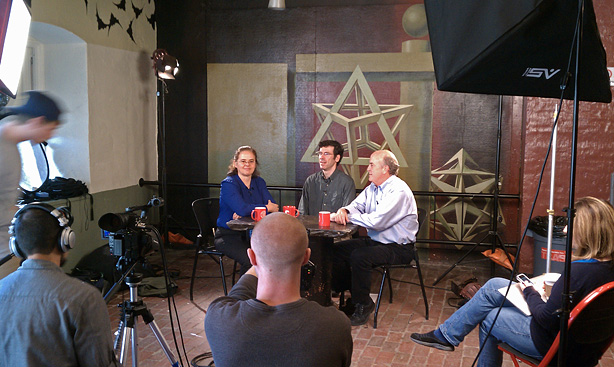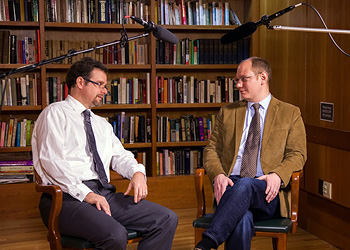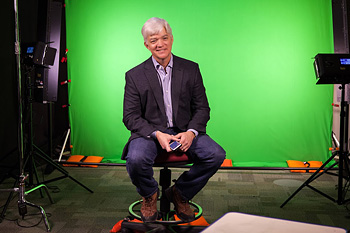
Professors Éva Tardos, Jon Kleinberg and David Easley record a roundtable discussion for their MOOC, "Network, Crowds and Markets." Photo: eCornell.
Register now for Cornell's spring MOOCs

Professors Ed Baptist and Louis Hyman discuss the rise of industrialized labor after the Civil War for their MOOC, "American Capitalism: A History." Photo: Barbara Friedman.
Explore the cosmos, digest digital surveillance, grasp global connections and consume capitalism: Registration for Cornell's inaugural semester of MOOCs is now open.
Beginning this spring, the university will offer its first four massive open online courses -- commonly known as MOOCs -- allowing anyone to take "CornellX" classes from the comfort of their home computer. The tuition is free.
Introductory videos and registration for each of the four classes is available at: https://www.edx.org/school/cornellx.
The MOOCs:
"Relativity and Astrophysics," taught by David Chernoff, professor of astronomy. While our ancestors saw wonder in the night sky, modern astronomy extends the human view to unexplored regions of space and time. Understand these discoveries through a focus on relativity -- Einstein's fascinating and nonintuitive description of the physical world. Starts Feb. 3, 2014.

Professor Stephen Wicker prepares for his final video shoot for his "Wiretaps to Big Data" MOOC. Photo: Barbara Friedman.
"Wiretaps to Big Data: Privacy and Surveillance in the Age of Complete Interconnection," taught by Stephen Wicker, professor of electrical and computer engineering. For anyone captivated by the technical, political and moral questions inherent in the use of information networks, surveillance sits at the intersection of networking technology, law and sociology. Find out how cellular technology makes surveillance possible, cellular user's rights and how this system affects our democratic institutions. Starts March 2, 2014.
"Network, Crowds and Markets," taught by Éva Tardos, the Jacob Gould Schurman Professor of Computer Science; David Easley, the Henry Scarborough Professor of Social Science and professor of information science; and Jon Kleinberg, the Tisch University Professor in computer and information science. Explore game theory, the structure of the Internet, social contagion, the spread of social power and popularity, and information cascades. Starts March 2, 2014.
"American Capitalism: A History," taught by Ed Baptist, associate professor of history, and Louis Hyman, assistant professor in the ILR School. While capitalism enjoys a global history, the United States plays a special role. Understand how the United States became the world's leading economic power, revealing lessons about what's possible in capitalism's ongoing revolution. This past decade's crises remind us just how capitalism changes, even as its basic features -- wage labor, financial markets, private property and entrepreneurs -- endure. Starts March 17, 2014.